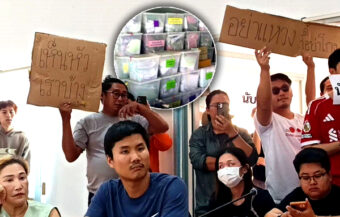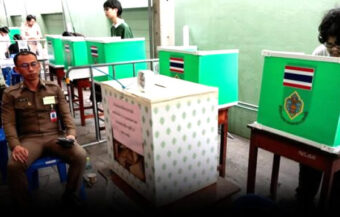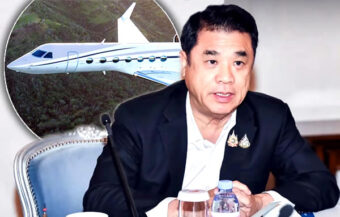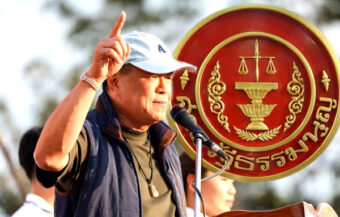Economic observers suggest that the export contraction has been filtering into the Thai domestic economy as one Bangkok Bank report this week suggests that small business people are using credit card cash advances to stay afloat.
This week, the government passed its economic stimulus package and reset its growth projection to between 2.7% and 3.2% for 2019. It certainly looked like it was coming to terms with the downturn. However, the domestic economy is now feeling the effects of the export contraction and there are signs that small business is still struggling. This week also, the opposition announced the beginning of its campaign to amend or replace the constitution but many political observers now feel that the fate of this government rests on the performance of the economy.
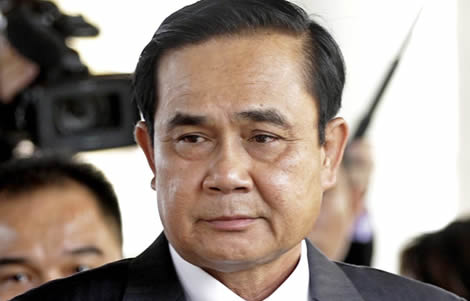
The future of the Thai government installed over the summer will be determined primarily on the performance of the economy. The government’s economic team is led by Deputy Prime Minister Somkid Jatusripitak who this week indicated that he is confident that the economy will begin to pick up again sometime in the last quarter of the year.
It comes as the opposition parties begin what is considered a medium to long term push to raise the issue of the Thai constitution and the need for constitutional reform in the country.
Economy and the constitution will be the twin issues that define this government
The economy combined with the issue of the constitution will be the defining factors in the success or failure of the government as it aims to complete a full term. It would be unwise to underestimate the ability of the current prime minister and the close team around him of deputy prime ministers such as Prawit Wongsuwan, Wissanu Krea-ngam and Somkid.
Debate on the constitution will generate into one on the government, the economy will be the context
The debate on the charter or constitution will, in fact, generate into a debate on the bona fides of the government itself and the performance of the economy will be the factor that will ultimately provide the environment which will decide much of the public not already polarised on one side of the political divide or the other.
Public support is the only way to change the constitution but the prospects of this are uncertain
The 7 party opposition to the government led by Pheu Thai has begun a public campaign to call for a new constitution or rewriting of the existing charter. It is thought that many opposition figures see this as the best to gain support for the work of the opposition parties and the only way in which the strict 2017 charter can be amended. The constitution was approved in 2016 by a valid plebiscite and opposition leaders see its reversal as a key priority. In effect, they are setting out to educate the public on the 2017 constitution and the need to change it. It has to be said that this is an uphill battle with a very uncertain outcome.
No one wants another election right now
This is believed to be part of a long term strategy. The opposition, like the government, is not especially interested in another election right now. The plan is to raise the issue of the constitution with the public while at the same time listening to grassroots feedback on the economy and other issues on the ground.
Opposition kicks off public roadshow touring Thailand throughout September
This will begin in September with a series of roadshows. Pheu Thai‘s Anusorn Iamsa-ard has outlined plans for a series of tours which will begin this weekend in Chiang Mai and move to Maha Sarakham in mid-September from September 14th to 15th. The opposition will then move to eastern provinces in the third week of September with meetings in Chachoengsao from September 21st to 22nd. At the end of the month, the roadshow will be in Yala province in southern Thailand from September 28th to 29th.
Government confident this week that stimulus package will help it achieve 3% growth in 2019
In the meantime, the government is confident its economic stimulus package, approved this week, will lead to a lift in the domestic economy. Experts believe that the dramatic slowdown in exports is now filtering into the domestic economy with overtime pay and incomes dropping. To counter this, Finance Minister Uttama Savanayana indicated last week that the economic stimulus will inject ฿200 billion into the Thai local economy by the end of 2019.
2nd interest rate reduction expected
Some economists are also now expecting a 2nd interest rate reduction by the Bank of Thailand before the end of the year. This would ease the burden on business and borrowers. It has also been pointed out that government stimulus measures have, in the past, a good track record in Thailand at stimulating growth.
The government is indicating that the final growth figure for this year should come in at between 2.7% and 3.2%.
Cannot assume that world economic conditions will not slip further this year, the risk is high
This, of course, assumes that the decline in exports will be halted and that world economic prospects at least stabilise. Brexit, for instance, will become a key issue as we approach October 31st and has the potential to be either a massive negative or positive if things, rather unexpectedly, go smoothly. This is an issue that has been weighing on the markets this year although perhaps behind the US-China trade war and emerging economic problems in Europe which are more pressing. Of course, in a globalised economy, it is all very much linked. It has to be said that overall the prospects are more bad than good.
Small business owners and freelancers are resorting credit card cash advances – Bangkok Bank
A sign of the slowing economy was clear this week when the Vice President for Bangkok Bank’s credit card division, Shoke Na Ranong, revealed that non-performing loans had inched up this year to 2.2% compared to 1.9% last year. He also outlined a trend where some small business owners were defaulting on monthly payments and drawing cash amounts on their credit card to fund their small business ventures. The bank executive said that the banks charged extra interest on such advances and it was not an economical or sustainable method of funding. He also suggested that the bank may look into placing limits on cash advances in certain situations in the future.
Government getting ahead of the curve
While there is no denying that Thailand has experienced a slowdown, the government in the last week or two has made strides in getting ahead of the problem. A new economic cabinet has begun to function on Fridays and an economic committee including the Finance Minister and the Bank of Thailand Governor has been reported.
In addition to the economic stimulus measures, there are also some indicators that tourism in August has begun to pick up. A growth rate of 3% would be a remarkable achievement when the state of the current world economy is taken into account. The problem is that this cannot be taken for granted.
Germany warns of recession
This week saw Germany, the much-vaunted engine of the European Union, signal that a recession may be looming. It highlights the unpredictable and dangerous state of world economic affairs right now.
Low government borrowing to GDP
Thailand has some things going for it. It still has a very low level of government borrowing in relation to GDP. This week, Jindarat Viriyataveekul, the director of the Thailand Public Debt Management Office policy and planning bureau explained that government debt to GDP in August was only 41.45%. This is planned to rise to nearly 47% in the next five years.
It compares very favourably to the developed world economies, many of which are borrowed in excess of 70%. It also conforms to Thailand’s own policy of fiscal sustainability which places a limit on borrowing of 60% of GDP.
Government debt is 97% held in baht but this means it is competing with the domestic business for funding
Ms Jindarat explained this during the week and also highlighted two very important factors. 90% of government debt is based on long term loans and 97% of the debt is denominated in Thai baht. This, of course, is a two-sided coin and means that the government is borrowing on the domestic market.
Last year, the former finance minister was reported to be looking at borrowing from foreign sources based on fears that government borrowing may be displacing funding from local businesses. This looks like it could be a factor in Thailand’s economic picture right now.
Further reading
Thai Economic team fights back with ฿370 billion stimulus aimed at achieving 3% growth this year
Thailand recession fears as airline losses mount with lower tourist numbers and a strong baht
Economic stimulus ready for cabinet as Thailand braves a credit squeeze and reeling economy
Moody’s – debt is 98.5% denominated in Thai baht as two views of the economy are at odds
Thailand’s small businesses and farmers are facing a crisis. The bankers are the ones that know






